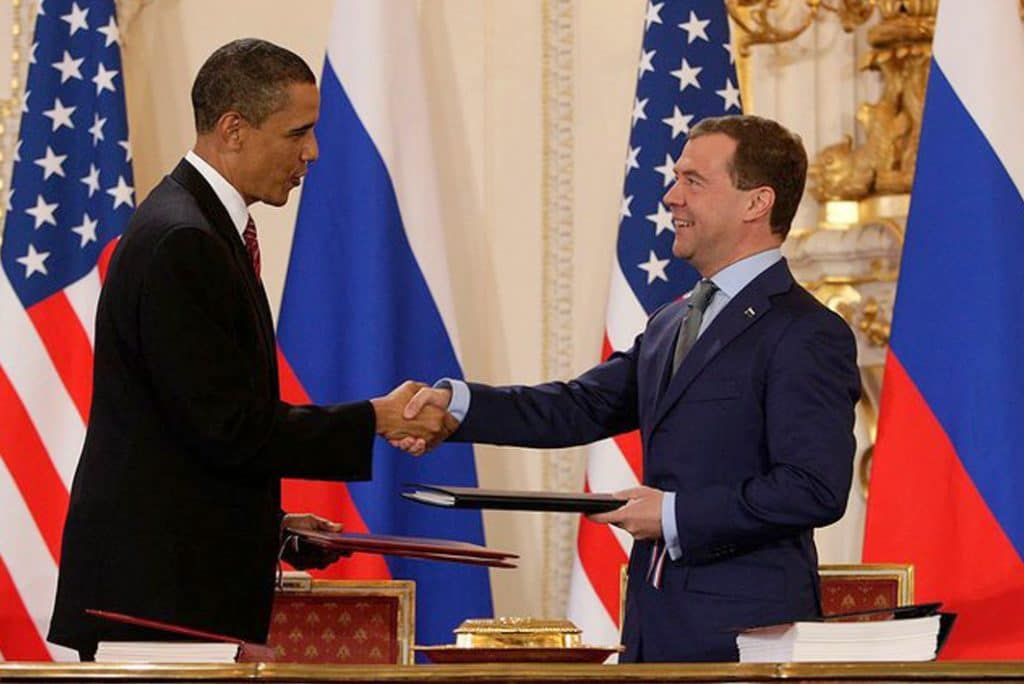Extend arms control for a safer future
By Science and Security Board | May 22, 2020
 Presidents Obama and Medvedev sign New START in 2010.
Presidents Obama and Medvedev sign New START in 2010.
There is one remaining nuclear treaty forestalling a nuclear arms race between the United States and Russia. The New Strategic Arms Reduction Treaty (New START), signed in 2010, is scheduled to expire on February 5, 2021. The US and Russian presidents can agree to extend the treaty by a period of up to five years without further approval from the US Senate, according to Article XIV of the treaty.
Under New START, US and Russian strategic nuclear arsenals cannot exceed 1,550 deployed warheads on 700 deployed strategic delivery systems. The treaty put in place an unparalleled system of on-site inspections and verification measures. This system, according to the US military and intelligence community, provides valuable transparency about Russia’s nuclear weapons, and the treaty’s limits on deployed strategic arsenals provide predictability. In its April 2020 report on arms control compliance, the US State Department attested that Russia remains in compliance with the treaty.
Russian officials, including President Putin, have stated for years that they are ready to extend the treaty without any preconditions. President Trump entered office disinclined to extend the treaty, and now senior administration officials say they are concerned about new Russian strategic delivery systems that are under development. But senior Russian officials have publicly stated that two of these weapons systems will be covered by New START, and independent experts assess that the other systems will not become operational before 2026, after the five-year term of extension of the treaty.
Recently, President Trump’s new special envoy for arms control, Marshall Billingslea, has expanded the administration’s complaints about New START, claiming that the Obama administration negotiated “a very weak verification regime. It really has very little of what the original START treaty contained and has significant loopholes in the way verification is physically conducted, which the Russians have been exploiting.” But as Rose Gottemoeller, the chief US negotiator of New START, recently explained in the Bulletin, the treaty’s verification regime is actually a carefully crafted and significant improvement over previous verification procedures and a major reason New START has been so effective.
President Trump and other senior administration officials say they want to engage in talks with Russia and China on a new and broader trilateral arms control agreement. Chinese officials have stated that they are not interested in such talks until US and Russian arsenals are further reduced and closer to the size of China’s. Former US military and diplomatic officials judge that it would be impossible to conclude a new agreement with Russia or China before New START is due to expire in 2021.
We call upon the leaders of the United States and Russia to immediately extend New START by five years so as to ensure the continuation of the limits on their nuclear arsenals, as well as the rigorous and effective inspection and verification regime put in place by the treaty. A decision by the presidents of the United States and Russia to extend New START would provide additional time and a stable foundation for further negotiations with Russia (and potentially with China) on new and more ambitious arms control arrangements. Keeping limits on strategic nuclear arsenals is an important way for the United States to demonstrate its commitment under Article VI of the Treaty on the Nonproliferation of Nuclear Weapons (NPT) to work toward nuclear disarmament.
If New START is allowed to expire in 2021 without a replacement treaty or agreement in place, there would be no limits on deployed strategic US and Russian nuclear weapons for the first time since 1972. The lack of verifiable limits on Russian nuclear weapons would pose a high risk to the national security of the United States and its allies, potentially triggering a renewed arms race. Such a state of affairs would make it even more unlikely that China would enter into stabilizing arms control discussions. Finally, a renewed arms race would cause significant damage to the NPT, which for 50 years has kept nuclear weapons from spreading around the world.
Together, we make the world safer.
The Bulletin elevates expert voices above the noise. But as an independent nonprofit organization, our operations depend on the support of readers like you. Help us continue to deliver quality journalism that holds leaders accountable. Your support of our work at any level is important. In return, we promise our coverage will be understandable, influential, vigilant, solution-oriented, and fair-minded. Together we can make a difference.
Keywords: Marshall Billingslea, NPT, New START, START, Treaty on the Nonproliferation of Nuclear Weapons
Topics: Analysis, Nuclear Risk, Nuclear Weapons














